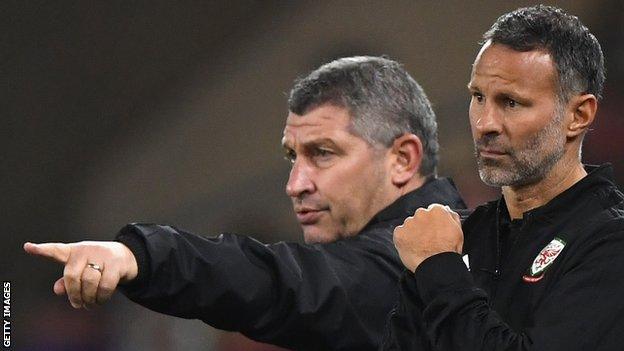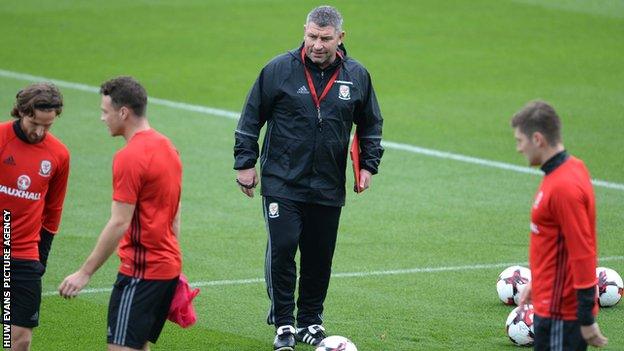Osian Roberts: Departing Wales assistant boss excited by Morocco challenge
- Published
‘It will always be a dream to manage Wales’
Osian Roberts says leaving his native Wales to become Morocco's technical director is the "right challenge at the right time."
Roberts has been Wales assistant manager under Gary Speed, Chris Coleman and current incumbent Ryan Giggs, and FAW Trust technical director for the last 12 years.
But having played a key role in transforming Welsh football fortunes - including reaching the Euro 2016 semi-finals - the 55-year-old is taking up a new role in North Africa.
"They've not done well over the last 12 to 18 months, so the president feels he wants to start afresh, a blank sheet of paper and has given me the opportunity to go and build something," Roberts told BBC Sport Wales.
"It's a new opportunity, a new project and I like that. Sometimes you have to make decisions in life and I'm really excited about this next chapter in my life."
Morocco has been among the favourites for the 2019 Africa Cup of Nations in Egypt.
But they suffered a shock penalty shootout defeat by Benin in the last 16 which led to the departure of coach Herve Renard, who had guided them to the 2018 World Cup finals.

Osian Roberts continued as a member of Wales' coaching staff following Ryan Giggs' appointment in 2018
Roberts said the approach from the Royal Moroccan Football Federation "came out of the blue."
"I was out in Armenia doing the technical analysis of the Uefa Under-19 tournament and got an invitation from the president to go and meet him in Morocco," Roberts added.
"I was able to do that in between games, liked what I saw, liked what I heard and without anticipating anything happening it came out of the blue.
"I've got some learning to do along the way but that's the challenge.
"There's a good structure in place, the facilities are fantastic. Everything's set up.
"They've underachieved in recent years and now is an opportunity for me to go there and influence that.
"My first job will be appointing a new head coach. I've got the full authority to be appointing all national team coaches and putting a philosophy in place.
"It's a footballing nation. We hear people saying, and I've said it for many years, that children don't play on the streets any more but they do in Morocco.
"So the type of player excites me.
"I'll probably invest more time on the grass with the younger age groups initially and then bring them through, something not too dissimilar to what I've done in Wales."
News of Roberts' departure was met which dismay by many Welsh fans, acknowledging his contribution to the national team but also his work at grassroots level.
Anglesey-raised Roberts was appointed technical director of the Football Association of Wales Trust in 2007 and has overseen the development of players and coaches.
Patrick Viera, Mikel Arteta and Thiery Henry are among the notable graduates of a coaching programme which has become world renown.

Osian Roberts was brought into the national team set-up by the late Gary Speed
He also overseen the development of players such as Ben Woodburn, Ethan Ampadu and Harry Wilson from age grade teams to the senior side.
But despite his departure, Roberts feels that he has left a legacy in Welsh football and that the game will thrive for many years to come.
"When you're technical director you're planning for the next 10 years," Roberts said.
"You're now seeing the fruits of what we were doing 10 years ago in terms of the players that are coming through into our national squad.
"That will continue because the next 10 years is in place.
"They're coming through on a regular basis and there will be more players that will come in to add to the current crop that we've got in the first team. I'm extremely proud of that.
"I couldn't have achieved any of it without the support around me, the staff that we've had over many years that have worked towards that aim and bought into the philosophy.
"Now they're in place the test will be can they continue with it. And if my work means anything it has to mean that it will continue."
"If it all falls flat on its face in the next 6 to 12 months then it means we haven't put a structure in place that has longevity to it.
"I'm fully confident that the people that are there will take it on to bigger and better things in the future."